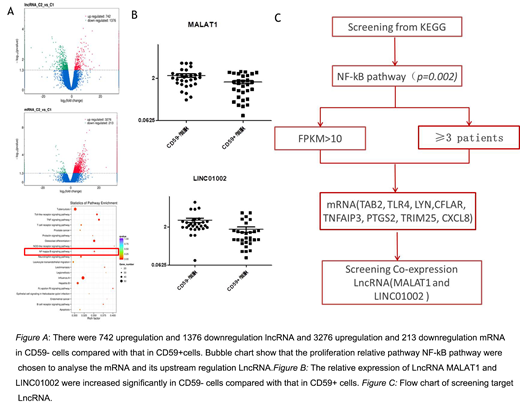Background: Paroxysmal nocturnal hemoglobinuria (PNH) is a rare clonogenic disease of hematopoietic stem cells. LncRNA has a wide range of biological functions, including regulation of gene expression, cell differentiation, cell proliferation and substance metabolism.LncRNA maybe contribute to the proliferation of PNH clone.
Methods:
PNH clone (CD59-cells) and (CD59+cells) from PNH patients were sorted and analyzed by RNA sequencing in 5 PNH patients. The results were analyzed by KEGG, we focus on the proliferation relative pathway-NF-kB pathway. The mRNA(TAB2, TLR4, LYN,CFLAR, TNFAIP3, PTGS2, TRIM25, CXCL8) which FPKM>10 and over 3 pathients were chosen to search out the upstream regulation LncRNA. MALAT1 and LINC01002 were screened by Co-expression. Then the expression of MALAT1 and LINC01002 in 30 PNH patients were detected by qRT-PCR to vertify the LncRNA sequencing results.
Results: Transcription analysis revealed that 742 upregulation LncRNA and 3276 upregulation mRNA were identified in CD59- cells. The highly expressed NF-kB pathway mRNA (TAB2, TLR4, LYN,CFLAR, TNFAIP3, PTGS2, TRIM25, CXCL8) were analysed by LncRNA co-expression, after that MALAT1and LINC01002 were concerned with the 8 mRNA. The results of PNH primary cells (CD59-cells) showed that the level of MALAT1and LINC01002 expression was significantly higher than that of the CD59+ cell in 30 PNH patients (p<0.05).
Conclusion: MALAT1and LINC01002 seems to be involved in the proliferation of PNH clones. Its mechanism of action in patients with PNH needs further study.
No relevant conflicts of interest to declare.
Author notes
Asterisk with author names denotes non-ASH members.


